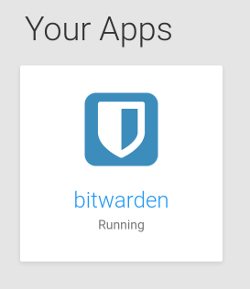Bitwarden - Self-hosted password manager
-
@jdaviescoates Namesake reads my mind.
@yusf
 heh, I only just realised Yusf is obviously Yussef which of course is the same as Josef
heh, I only just realised Yusf is obviously Yussef which of course is the same as Josef 
-
@iamthefij I haven't followed the thread continously but is there a specific reason for emailing all users who are granted access to the app through the SSO?
-
@iamthefij I haven't followed the thread continously but is there a specific reason for emailing all users who are granted access to the app through the SSO?
@yusf Yea, the Readme describe the reasoning.
There is no way to actually do true SSO without breaking the model for Bitwarden. The only thing that we can do is automatically invite users to sign up.
The Bitwarden_rs project doesn't have a way to invite without sending an email as when an SMTP server is configured, it will generate unique invite links for each user.
If you disable SSO, you only disable the auto-invite feature. You will then need to invite yourself via the Admin panel (admin token is echoed in the logs and in
/app/data/admin_token). You can then invite anyone else you wish manually. -
Is there a reliable way to move from Bitwarden SQLite (fbartels build) to Bitwarden MySQL (iamthefij build) including all attachments?
-
thanks @iamthefij
For those looking to install this:
$ git clone ssh://git@git.cloudron.io:6000/iamthefij/bitwardenrs-app.git $ cd bitwardenrs-app $ cloudron install --image iamthefij/cloudron-app-bitwarden:0.3.0Aaaannd it's running:

After installing, both my users got an invite to join bitwarden. Very cool.
-
@yusf Yea, the Readme describe the reasoning.
There is no way to actually do true SSO without breaking the model for Bitwarden. The only thing that we can do is automatically invite users to sign up.
The Bitwarden_rs project doesn't have a way to invite without sending an email as when an SMTP server is configured, it will generate unique invite links for each user.
If you disable SSO, you only disable the auto-invite feature. You will then need to invite yourself via the Admin panel (admin token is echoed in the logs and in
/app/data/admin_token). You can then invite anyone else you wish manually.@iamthefij I can't login to the admin page. It keeps saying "invalid token"
I did a fresh boot of the container, copied everything between access token= and HTTP/1.1"
access_token= copied this giberish HTTP/1.1"Thoughts?
-
Just to inform everyone here, today I've created a new gitlab project for this app package repo wise, based on @iamthefij version, however without relying on external dockerimages being mounted during app image building. The repo is at https://git.cloudron.io/cloudron/bitwardenrs
One thing I wanted to ask here is, how to deal with ldap sync. Generally this works currently by a cron job running every now and then, checking availalbe users on ldap and then will invite all users, which are not yet invited to the app instance. This has the current annoying thing, where if an admin wants to first try bitwarden on the Cloudron and does not restrict access during installation, the app will send out invites to all users. Since this is the default flow, I don't want to publish the app package like that. On the other hand I do see value in those invites being sent out at the point where the admin decides this app is good to be used.
To not delay any package release further, we could avoid this topic by packaging it first without ldap, but I wanted to collect some feedback on this here in the thread first. It would be great if you all could share your ideal flow regarding this and maybe explain the use-cases briefly.Thanks! And even more thanks to @iamthefij for all the work done on the package already!

-
Just to inform everyone here, today I've created a new gitlab project for this app package repo wise, based on @iamthefij version, however without relying on external dockerimages being mounted during app image building. The repo is at https://git.cloudron.io/cloudron/bitwardenrs
One thing I wanted to ask here is, how to deal with ldap sync. Generally this works currently by a cron job running every now and then, checking availalbe users on ldap and then will invite all users, which are not yet invited to the app instance. This has the current annoying thing, where if an admin wants to first try bitwarden on the Cloudron and does not restrict access during installation, the app will send out invites to all users. Since this is the default flow, I don't want to publish the app package like that. On the other hand I do see value in those invites being sent out at the point where the admin decides this app is good to be used.
To not delay any package release further, we could avoid this topic by packaging it first without ldap, but I wanted to collect some feedback on this here in the thread first. It would be great if you all could share your ideal flow regarding this and maybe explain the use-cases briefly.Thanks! And even more thanks to @iamthefij for all the work done on the package already!

-
Just to inform everyone here, today I've created a new gitlab project for this app package repo wise, based on @iamthefij version, however without relying on external dockerimages being mounted during app image building. The repo is at https://git.cloudron.io/cloudron/bitwardenrs
One thing I wanted to ask here is, how to deal with ldap sync. Generally this works currently by a cron job running every now and then, checking availalbe users on ldap and then will invite all users, which are not yet invited to the app instance. This has the current annoying thing, where if an admin wants to first try bitwarden on the Cloudron and does not restrict access during installation, the app will send out invites to all users. Since this is the default flow, I don't want to publish the app package like that. On the other hand I do see value in those invites being sent out at the point where the admin decides this app is good to be used.
To not delay any package release further, we could avoid this topic by packaging it first without ldap, but I wanted to collect some feedback on this here in the thread first. It would be great if you all could share your ideal flow regarding this and maybe explain the use-cases briefly.Thanks! And even more thanks to @iamthefij for all the work done on the package already!

@nebulon yea, the best for Cloudron would be a way to silently invite so only ldap users could sign up. Maybe I’ll make that suggestion over at the main project.
I feel that would make a much better experience for users and admins here.
What I did was install it scoped to only my user and then expanded the users to a group later.
-
Just to inform everyone here, today I've created a new gitlab project for this app package repo wise, based on @iamthefij version, however without relying on external dockerimages being mounted during app image building. The repo is at https://git.cloudron.io/cloudron/bitwardenrs
One thing I wanted to ask here is, how to deal with ldap sync. Generally this works currently by a cron job running every now and then, checking availalbe users on ldap and then will invite all users, which are not yet invited to the app instance. This has the current annoying thing, where if an admin wants to first try bitwarden on the Cloudron and does not restrict access during installation, the app will send out invites to all users. Since this is the default flow, I don't want to publish the app package like that. On the other hand I do see value in those invites being sent out at the point where the admin decides this app is good to be used.
To not delay any package release further, we could avoid this topic by packaging it first without ldap, but I wanted to collect some feedback on this here in the thread first. It would be great if you all could share your ideal flow regarding this and maybe explain the use-cases briefly.Thanks! And even more thanks to @iamthefij for all the work done on the package already!

@nebulon I'm not certain why this app would be unique in that when it's setup it just immediately sends out invites to everyone possible. Seems very strange to have it work that way.
Not sure if it's possible, but I think my ideal vision of it is that when we select an LDAP group for authentication, it will allow those users access / send an invite once they attempt the first login from an allowed group, but otherwise it would not auto-invite anybody.
And if that can't be done then I'd prefer it just be a manual invite or even "app managed" instead like Invoice Ninja or something where you don't need to have LDAP be the authenticator for the app and can manage it fully inside the app itself instead.
Hopefully I didn't misunderstand the situation and question.
 haha
haha -
@d19dotca yes that would be nice to only send invites upon user login attempt, or even better to not send invites but just allow users in that LDAP group to signup normally. However currently this is not possible with the upstream app. So my suggestion is to polish the app package now without any LDAP, since it is confusing currently and just get it pulished. We can always add LDAP once the flow is more obvious and straightforwards.
-
@d19dotca yes that would be nice to only send invites upon user login attempt, or even better to not send invites but just allow users in that LDAP group to signup normally. However currently this is not possible with the upstream app. So my suggestion is to polish the app package now without any LDAP, since it is confusing currently and just get it pulished. We can always add LDAP once the flow is more obvious and straightforwards.
@nebulon Ah okay, didn’t realize it was an app limitation rather than a packaging limitation. In that case then I would definitely prefer it be pushed without LDAP support (so app-managed) and we can add LDAP support at a later time when the app will allow a better workflow.
-
 G girish locked this topic on
G girish locked this topic on
